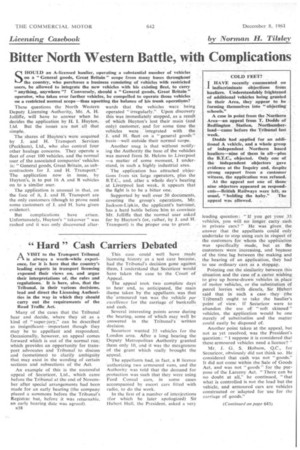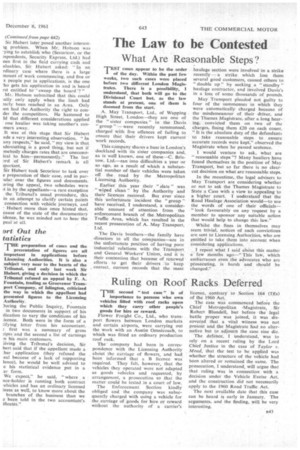" Hard 99 Cash Carriers Debated
Page 72

Page 77

If you've noticed an error in this article please click here to report it so we can fix it.
AVISIT to the Transport Tribunal is always a worth-while experience, for it is here that the country's leading experts hi transport licensing expound their views on, and argue their interpretations of, the rules and regulations. • It is here, also, that the Tribunal, ha their various decisions, lead and direct the Licensing Authorities in the way in which they should carry out the requirements of the . Road Traffic Act.
Many of the cases that the Tribunal hear and decide, where they sit as a kind of "super-jury," can be described as insignificant—important though they may be to appellant and respondent. Occasionally, however, an appeal comes forward which is out of the normal run; which provides an opportunity for transport advocates and Tribunal to discuss and (sometimes) to clarify ambiguity that may exist in the wording of certain sections and subsections of the Act.
An example of this is the successful appeal of Securicor, Ltd., which came before the Tribunal at the end of November after special arrangements had been made for an early hearing (the company placed a summons before the Tribunal's Registrar but, before it was returnable. an early hearing date was agreed), .
n38
This ease could well have . made licensing history ,aS a test case because, had the Tribunal's decision gone against them, I understand that Securicor would have taken the case to the Court of Appeal..
The appeal took two complete days to hear and, as anticipated, the main theme taken by the appellants was that the 'armoured van was the vehicle par excellence for the carriage of bankrolls and cash.
Several interesting points arose during the hearing, some of which may well be answered in the Tribunal's written decision.
Securicor wanted 35 vehicles for the London area. After a long hearing the Deputy Metropolitan Authority granted them only 10, and it was the meagreness of the grant which really brought the appeal.
The appellants had, in fact, a B licence authorizing two armoured vans, and the Authority was told that the demand for protection was such that they were using Ford Consul cars, in sonic cases accompanied by escort cars fitted with radio, to do the work.
In the first of a number of interjections (for which he later apologized) Sir Hubert Hull, the President, asked a very
-leading question: "If you get your .35 vebiales, you will no longer carry cash in private ears?" He was given the answer that the appellants could only undertake to stop using cars in respect of the customers far whom the application was specifically made, but as the customers Were increasing, and because of the time lag between the making and the hearing of an application, they had to use ordinary cars as a, stopgap.
Pointing out the similarity between this situation and the case of .a carter wishing to give Up horse-drawn vehicles in place Of m6tor vehicles, or the substitution of petrol lorries with diesels, Sir Hubert said that in such a case they (the Tribunal) ought to take the haulier's point of view. If Securicor were to abandon the use of "soft skinned" vehicles, the application would be one merely of substitutibn and the matter could easily be disposed of.
Another point taken at the appeal, but not as yet resolved, was the President's question: "I suppose it is considered that these armoured vehicles need a licence? "
Mr. J. G. S. Hobson, Q.C., for Securicor, obviously did not think so. He considered that cash was not "goods." It did not come within the Sale of Goods Act, and was not " goods " for the purpose of the Larceny Act. "There can be no doubt at all," he continued, "that what is controlled is not the load but the vehicle, and armoured cars are vehicles constructed or 'adapted for use for the carriage of goods."
Sir Hubert later posed another interestig problem. When Mr. Hobson was -ying to establish who (Securicor, or the :.spondents, Security Express, Ltd.) had een first in the field carrying cash and aluables, Sir Hubert asked: In an rdinary case where there is a large mount of work commencing, and five or x people put in applications, is the one ho gets his application in and is heard rst entitled to sweep the board '? " Mr. Hobson submitted that this could ally only apply when the limit had !.arly been reached in an Area. Only men had the Authority the right to conder the competitors. He hastened to Id that different considerations applied one haulier was taking another's cusmers away.
It was at this stage that Sir Hubert ade a very interesting observation. "In any respects,he said, " my view is that Idercutting is a good thing, but not if rnebody charges rates that are uneconoical to him—permanently." The last ord of Sir Hubert's remark is all 'portant.
Sir Hubert took Securicor to task over e preparation of their case, and in parular over the figures and documents. tiring the appeal, two schedules were it in by the appellants—a rare exception the Tribunal's usual procedure, this in an attempt to clarify certain points connection with vehicle journeys, and Hubert more than once hinted that, cause of the state of the documentary idence, he was minded not to hear the peal at all.




































































































































